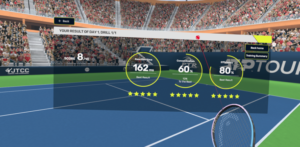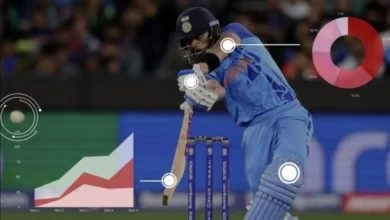The Psychological Benefits of Playing Tennis in VR

Virtual Reality (VR) has quickly moved from an exciting idea to playing a significant role in many areas, changing how we use digital worlds. It’s used in schools, healthcare, building design, and fun activities, giving people new ways to learn, heal, design, and have fun. One exciting use of VR is tennis games.
These games mix tennis’s physical and mental parts with virtual play, letting people enjoy sports and exercise without leaving their homes. This paper will examine how playing tennis in VR improves mental health. It will explore how this new way of playing a classic game can help with stress, make us think better, and help us make friends in ways different from regular sports or video games.
Contents
Background on VR Tennis
VR tennis has come a long way thanks to recent improvements in VR technology, including better graphics, faster response times, and more accessible controls. These improvements have allowed players to experience tennis in a new and exciting way, mixing exercise with the endless opportunities VR offers.
Additionally, the immersive nature of VR tennis opens up unique avenues for engagement, such as the option to tennis bet on the 1xbet, adding an extra layer of excitement and involvement for fans and players alike.
Psychological Benefits of VR Tennis
Playing VR tennis is not just for fun; it’s also perfect for your mind. It’s like stepping into another world where you can forget about stress and give your brain a workout. You have to make fast decisions and think on your feet, which makes you sharper. Plus, it makes you feel happier, acts like a mini-vacation from real-life worries, and can even help you feel sad or anxious.
Playing with others online is also a great way to make friends and feel less alone, something you might not get from regular video games or playing sports outside. VR tennis shows us how cool technology can be for our mental health, helping us feel better by playing a game.
Stress Reduction
Playing tennis in virtual reality (VR) is a new and fun way to reduce stress. It mixes the physical activity from real sports with the fun of video games, making it different from just sitting and playing games or playing sports outside. In VR tennis, you move around like you’re playing tennis, which helps relieve stress better because you’re both thinking and moving.
You don’t need much space or good weather to play VR tennis, so you can do it anytime, making it easier to manage stress whenever needed. Also, VR tennis is safer and less tiring than real tennis, which is excellent for those who want to stay active but not overdo it. Overall, VR tennis is a handy and effective way to tackle stress by combining the best parts of video games and physical sports.
Enhanced Cognitive Skills
Playing tennis in virtual reality (VR) is fun and helps improve essential thinking skills. When you play VR tennis, you must make quick decisions and adjust to changes, which helps you react faster. You also improve at thinking ahead and making plans, just like in a real tennis game.
Plus, it helps you understand space better, as you need to move and hit the ball correctly in the game. This virtual game does a great job of training your brain while you move your body, just like real tennis. So, by playing VR tennis regularly, you can get faster reflexes, better plans, and a good sense of space, making it a great way to sharpen your mind.
Mood Improvement
Playing VR tennis has been good for improving moods and helping with depression and anxiety. It’s a new way to help with mental health. Playing in the VR world is so engaging that you forget about everyday worries, giving you a break from stress. Research shows that moving around and thinking hard in VR tennis makes your body release endorphins, which make you feel happier.
Also, getting better at the game or winning can make you feel good about yourself, which is excellent for people who are feeling down. For those who get anxious, VR tennis is a calm and predictable place to exercise and meet people without feeling stressed. Playing with others in VR also helps you make friends and feel supported, which is essential for feeling emotionally intense. So, VR tennis is not just fun; it’s a powerful way to help with mood and reduce symptoms of depression and anxiety, showing how VR can be beneficial for mental health.
Social Interaction
Multiplayer VR tennis games show how advanced technology can help us connect with others, even when we can’t be physically close. When players put on their VR headsets and play tennis, they do more than play a game. They’re entering a world where they can talk, work together, and compete with others in real-time. This creates a feeling of community and togetherness that’s hard to find in our digital world.
For people who feel lonely because they live far away, have trouble moving around, or are shy, VR tennis is a great way to meet people, share fun moments, and make new friends. The VR experience makes these interactions feel real and personal, helping to reduce loneliness. So, multiplayer VR tennis isn’t just a game. It’s an essential way for many people to feel connected and valued.
The Therapeutic Use of VR Tennis

Virtual Reality (VR) tennis in therapy is an exciting development at the crossroads of technology, therapy, and sports. Known for its immersive experiences, VR is increasingly seen as a valuable tool in therapy and rehabilitation. VR tennis creates a realistic tennis environment in a virtual space, allowing people to be active without needing a real tennis court. This makes it ideal for those in rehabilitation or who don’t have easy access to traditional sports facilities.
Recent studies have shown that VR tennis can significantly improve patients’ motor skills, coordination, and balance. For example, patients recovering from strokes or traumatic brain injuries have improved arm strength and hand-eye coordination after playing VR tennis. The game can be tailored to patients’ recovery needs, making their rehabilitation personalized and effective.
Plus, the fun and engaging nature of VR tennis encourages regular participation, which is critical to the success of any rehab program. In summary, VR tennis provides a new way to help physical recovery and adds an enjoyable and motivating aspect to rehabilitation exercises.
Comparison with Physical Tennis and Other VR Sports
VR tennis offers unique benefits over traditional tennis because it’s more accessible and convenient. Unlike traditional tennis, which needs a court, racket, ball, and often a partner, VR tennis can be played alone at home with VR equipment.
This makes it available to more people, including those with physical disabilities or those who don’t have easy access to tennis facilities. VR tennis also saves the time and hassle of travelling and scheduling, making it a handy choice for busy people or those looking for a quick, immersive break without the complications of setting up a physical game.
Compared to other VR sports, tennis provides several psychological advantages. The game requires continuous focus, strategy, and physical effort, which are well-suited to the VR setting, creating an engaging mix of mental and physical exercise. This can help improve reaction times, strategic thinking, and hand-eye coordination.
While other VR sports may emphasize physical or strategic elements more heavily, VR tennis offers a well-rounded experience that appeals to a wide range of players, providing both mental stimulation and physical activity. This balance makes VR tennis a fun and comprehensive exercise that offers extensive psychological benefits, from reducing stress to boosting cognitive skills.
Challenges and Considerations
Playing tennis in virtual reality (VR) has many mental benefits, but it’s essential to be aware of the downsides of using VR too much for mental health. One big concern is needing to be more active physically. Even though VR tennis can get you moving more than regular video games, it might not give you all the exercise and heart benefits you’d get from playing real tennis. It’s essential to keep a balanced lifestyle with plenty of physical activities outside VR.
Also, using VR often can cause eye strain and motion sickness and sometimes make people feel lonelier, especially if it replaces hanging out with people in real life. The key is to use VR in moderation. Adding VR tennis to a healthy routine that includes exercise, outdoor time, and meeting up with friends can help avoid these problems, letting you enjoy VR’s mental benefits while staying healthy overall.
Future Directions

As VR technology improves, we can expect VR tennis and its benefits for our minds to grow, too, offering new ways to help us feel better mentally. In the future, the game could become more lifelike and immersive, with suits that let you feel the game’s actions and technology that captures your movements more accurately, making the game feel more like real tennis. This could make the game even better, helping us relax and feel happier.
Also, we might see brilliant virtual coaches who give feedback just for you, helping you in a way that fits your emotional and mental needs. This could be a big help for mental health. Researchers are also looking into how VR tennis might help people with anxiety or PTSD by giving them a safe space to move around and practice being mindful.
Plus, VR tennis could bring people together through worldwide virtual tournaments or places to hang out online, which could help reduce loneliness and build a sense of community. As we explore these ideas, VR tennis could become more than a game. It could turn into a versatile tool for improving:
- mental health,
- mixing fun,
- therapy,
- physical activity.
Conclusion
To wrap up, playing tennis in virtual reality (VR) can help your mind in many ways. It can make you feel less stressed, think better, cheer you up, and help you make friends. These good points show us how VR sports could be a great way to help with mental health. VR tennis is more than just a game; it could also help people feel better mentally because it’s easy to get into and fun to play.
But we still have much to learn about how VR tennis can help us mentally. We need more research and more people to get involved in this area. Experts, game makers, and everyone else should look more into how VR sports can benefit our minds. By doing this, we could find new ways to improve mental health and make virtual sports a big part of staying healthy.



